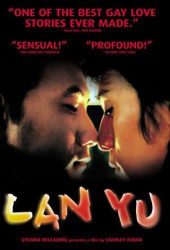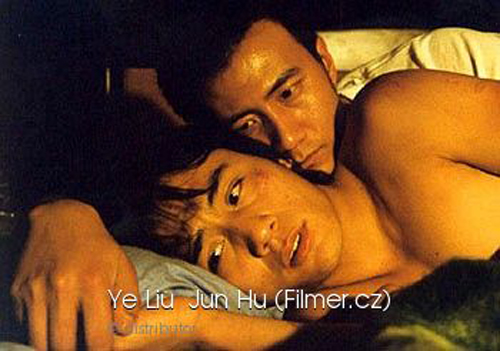 Lan Yu
Lan Yu
Directed by Stanley Kwan
Written by Jimmy Ngai
Premiered May 1, 2001 at Cannes Film Festival
U.S. Premier: Jan. 2002, Sundance Film Festival
Drama (foreign)
86 min. • Find on imdb • Trailer on YouTube
Review by Stephen O. Murray
July 11, 2002.
Gay Hong Kong director Stanley Kwan (Rouge, Yang + Yin) has received praise for his bravery in filming the torrid Internet novel Beijing Story (bylined “Beijing comrade”—tongzhi being a word adopted by Chinese gay men as a positive label for themselves) in Beijing without official permission.
Since almost the entire movie takes place indoors and there is nothing in the outdoor locations that is distinctly Beijing, I do not see what the point of filming in Beijing was. Similarly, there are references to the cold, but it is obvious that the film was not shot in winter-time.
Lan Yu (directed by Stanley Kwan, 2001) has also been hailed as the first Chinese movie about homosexuality. This claim is even more dubious than the need to shoot it in Beijing. Fellow Hong Kong filmmaker Wong Kar-Wai made a technically more daring film about a difficult gay relationship, Happy Together (Cheun gwong tsa sit, 1997). Though most of Wong’s moody film takes place in Argentina (and Ang Lee’s 1993 The Wedding Banquet in New York), the star of Lan Yu, Hu Jun appeared in an earlier gay-themese film recognizably set in Beijing East Palace, West Palace (Dong gong xi gong, 1996). There is less sense of gay networks in Lan Yu than in Happy Together—or even in the historical melodrama Farwell, My Concubine (Ba wang bie ji, 1993).
I’d say that all four of the other films mentioned in the previous paragraph have less conventional plots than Lan Yu has. The jaded businessman Chen Handong [Jun Hu] is supplied an attractive virgin from the countryside, Lan Yu [Ye Liu], who is an architecture student. Chen warns Lan that his relationships are short-term. Lan does not know how to give his body without giving his heart, falls in love with his patron, and remains devoted after being dumped.
Chen marries someone else (a smart and attractive woman who is a Russian-Chinese translator), but eventually realizes his true love was the one he threw away. They get back together, Lan Yu proves his devotion, and dies in a tragic accident after saving Chen’s life.
The vagaries of contemporary Chinese history impinge, but only a bit. There is a reconciliation the night the Red Army moved against the demonstrators in Tiananmen Square, and it is a crackdown on corruption (dubious business dealings like those that enriched Cheney and Bush) that puts Chen in danger of being executed. That Chen is able to get across Beijing the night of the Tiananmen massacre and find Lan is hard to believe. That bribery can save Chen from capital charges is considerably more believable (look at who was the head of the SEC that decided not to indict Bush over his Harken dealings…)
The course of true love not running smooth between attractive Chinese men brings Happy Together to mind, but if Lan Yu were a woman (and wasn’t shown naked) the basic story of the true love by the financial beneficiary of a relationship with a rich and jaded man not worthy of such devotion is the stuff of many, many Hollywood women’s pictures of the 1930s and ’40s (Lan Yu gives up a villa instead of a child as in Back Street or To Each His Own).
But Lan Yu is male, so that Chen’s marrying someone else seems less about class difference than about the filial duty to produce a son (and I mean a son, not a child) that gay Chinese men continue to feel. It would seem that Chen is more modern, an urban sophisticate. His coworkers know he picks up young males (I don’t remember for sure if one arranged the initial encounter with Lan Yu). In that Lan Yu is from the more traditional countryside, it is odd that he is not the one who feels the pressure to marry a woman. I guess it is that the explanation might be generational difference: Lan is from a post-Maoist generation. Chen cried when Mao died; Lan remembers his father crying then.
Aside from its basic tearjerker plot, and the general lack of adequate lighting, the movie is irritating because of its unmooring in time. Chen goes to the airport after his wedding photo session. In the next scene he is leaving the airport and runs into Lan Yu (what a small world!). The audience learns that his marriage has come and gone between when we saw him leave for the airport and be in the airport. And this is not the longest time gap between scenes (that would be a ten-year one). Kwan could easily enough have put dates on the screen instead or had the actors made up to look older, but chose to make the audience figure out that long stretches of time have passed from scene to scene.
The Internet novel, allegedly the most read work in contemporary China (published in English in 2016 as Beijing Comrade), had a lot more sex than the movie does. With his long legs, long pubic hair, sharp cheekbones, and soulful eyes on display, Ye Liu provides significant eye candy. Both he and Hu Jun can act, though there is not the passion between them that there was between Leslie Cheung and Tony Leung in Happy Together.
Finally, given the history of killing off gay characters in the final reel, I am suspicious of Lan Yu being killed. If they cannot live happily ever after, why is it the bisexual lover who is left standing (well, driving pointlessly), not the gay one? Vito Russo’s The Celluloid Closet chronicles the pattern in Hollywood movies through the 1970s, and it is flamboyantly present in Chen Kaige’s (1993) Farewell, My Concubine—though not in Happy Together. So I don’t see Lan Yu as groundbreaking, though I enjoyed looking at Ye Liu.
Originally published on epinions, 11 July 2002
©2002, 2016, Stephen O. Murray
Trailer at https://youtu.be/mtIxoujt15k


